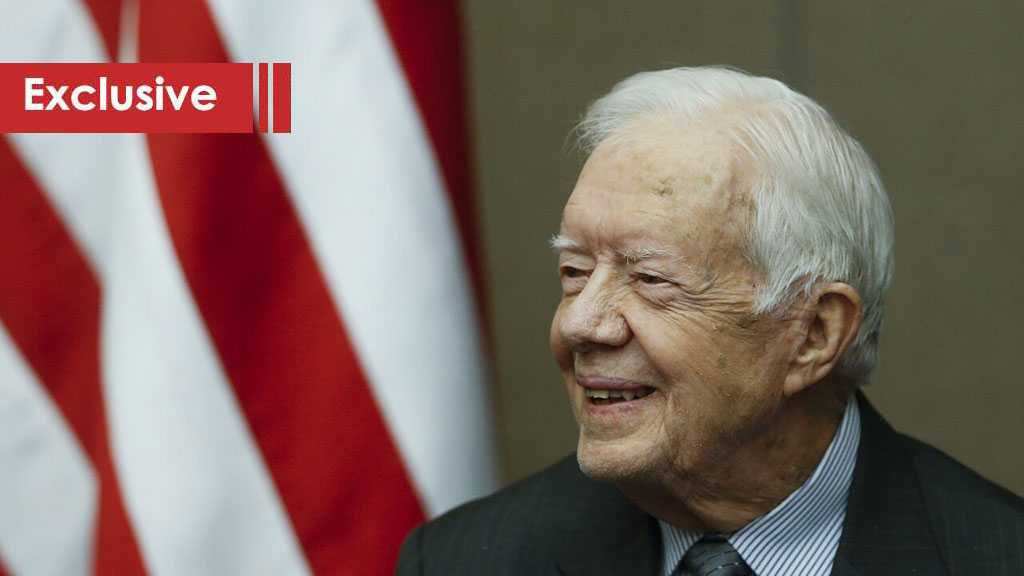
Jimmy Carter: A Legacy of Faith and Controversy

By Mohamad Hammoud
Lebanon - Jimmy Carter, the 39th President of the United States, is a figure whose legacy is deeply intertwined with his religious faith and his efforts in the Middle East. Carter’s Southern Baptist roots distinguished him as a devout Christian, committed to values such as human rights and peace. Unlike other prominent Southern Baptists of his era, such as Rev. Billy Graham, Carter’s faith often led him to positions that challenged established norms, including those concerning the Middle East. This essay examines Carter’s religious convictions, the backlash he faced from "Israeli" lobbyists despite his prior support for "Israel," and the critical issues he raised regarding Palestinian treatment that fueled this discord.
Religious Faith
Jimmy Carter's religious faith has been a cornerstone of his life and career. As a Southern Baptist, he emphasized the importance of living out Christian principles through service and advocacy for the oppressed. However, Carter’s interpretation of Christianity set him apart from other Christian figures like Rev. Graham, who often aligned more closely with the political and cultural establishment. While Graham’s ministry emphasized evangelical outreach and collaboration with political leaders to support the state of "Israel," Carter’s faith drove him toward activism and confronting injustices, even when it meant alienating powerful constituencies.
During his presidency [1977-1981], Carter demonstrated strong support for "Israel," exemplified by his pivotal role in brokering the Camp David Accords between "Israel" and Egypt. This historic agreement, signed in 1978, secured peace between the two nations and reinforced US-"Israel" relations. However, Carter’s steadfast commitment to human rights also made him a vocal critic of "Israeli" policies toward Palestinians. After leaving office, he expressed these concerns more pointedly, particularly in his 2006 book, Palestine: Peace Not Apartheid, which was seen as a departure from the typical pro-"Israel" stance of many American politicians. The book provoked significant controversy and condemnation from pro-"Israeli" organizations.
Critical Issues Raised in Palestine: Peace Not Apartheid
Carter's book raised several critical issues that angered many pro-"Israel" advocates. One of the most contentious aspects was his comparison of "Israel's" policies in the occupied Palestinian territories to apartheid in South Africa. He stated, “The "Israeli" government has maintained a system of apartheid in the occupied territories,” emphasizing the need for recognition of Palestinian rights alongside "Israeli" security concerns.
Carter argued that "Israel's" continued control and colonization of Palestinian land were major obstacles to peace. He also criticized the expansion of "Israeli" settlements in the West Bank, calling them illegal under international law and a hindrance to the creation of a viable Palestinian state.
Carter called for "Israel" to withdraw from the occupied territories and return to the pre-1967 borders, with some land swaps to accommodate major "Israeli" settlements. He highlighted human rights abuses against Palestinians, including restrictions on movement, economic hardships, and violence. Carter argued that these conditions were unjust and needed to be addressed for any peace process to succeed. His critique of US foreign policy for being too biased in favor of "Israel" further fueled the controversy.
Despite his previous support for "Israel," Carter faced swift and intense backlash from "Israeli" lobbyists and pro-"Israel" organizations. These groups accused Carter of undermining "Israel’s" legitimacy and promoting a biased narrative. Critics, including prominent figures within the American-"Israeli" Public Affairs Committee [AIPAC], condemned Carter’s use of the term apartheid, arguing that it mischaracterized the complexities of the "Israeli"-Palestinian conflict.
Carter defended his position by asserting that his critiques were aimed not at the Jewish people but at the policies of the "Israeli" government. He maintained that his Christian faith compelled him to advocate for the rights of Palestinians and to speak out against injustices. Despite his intentions and background, he was labeled as anti-Semitic.
As John Mearsheimer and Stephen Walt discuss in their seminal work, The Israel Lobby and US. Foreign Policy, dissenting voices like Carter’s often face severe condemnation from the "Israeli" lobby, which wields significant influence over US foreign policy. Mearsheimer and Walt argue that the lobby’s ability to shape discourse on "Israel" can stifle constructive criticism, even from figures with a history of supporting "Israel," such as Carter. The authors used Jimmy Carter's book Palestine: Peace Not Apartheid as a prime example. In their analysis, they argued that the backlash Carter faced was part of a broader pattern where the "Israel" lobby seeks to discredit and silence critics by labeling them as anti-Semitic.
Conclusion
Jimmy Carter's legacy is a complex and multifaceted one. His religious faith guided his actions and fueled his commitment to social justice and human rights. Despite his previous support for "Israel," Carter faced significant backlash from "Israeli" lobbyists after the publication of his book Palestine: Peace Not Apartheid. The critical issues he raised in the book, including his comparison of "Israeli" policies to apartheid and his call for Palestinian rights, sparked controversy and accusations of anti-Semitism. Carter's willingness to speak out on such a contentious issue demonstrated his commitment to his principles, even in the face of widespread criticism. His legacy serves as a reminder of the importance of addressing human rights issues and striving for a just and lasting peace in the Middle East.
Comments

Jimmy Carter: A Legacy of Faith and Controversy
2 months ago
The Disturbing Truths of American Society
2 months ago
